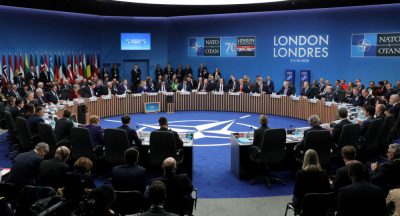
Longtime businessman and politician Guido Crosetto stated on the sidelines of a conference in Padua that NATO needs to adapt and engage with the Global South, according to the Italian news agency ANSA. However, despite Crosetto speaking sense about the current reality of NATO, he has been a long supporter of the Kiev regime and critic of Russia, which sends a confused message to the Global South.
“Before, US and Europe used to be the center of the world — now, there is everything else with which a relationship must be built. We often talk as if we were still living 30 years ago, but everything has changed,” the Italian defense minister said, days before the meeting of the member states of NATO in The Hague.
In this regard, the representative of the government of Giorgia Meloni warned that
“if NATO was created to guarantee peace and mutual defense, it must become an organization that assumes this role at a global level – interacting with the Global South, from Brazil to India – and thus become something profoundly different – or we will not achieve the objective of security within rules that apply to everyone.”
Crosetto also stated that both the European continent and the United Nations no longer count on the global stage.
“We talk about Europe as if Europe mattered. Perhaps once, it could have mattered, if it had given itself a political role that it did not give itself — if it had equipped itself with a foreign policy or defense,” the defense minister said. “But its time is over — and I say this with sadness. The world has changed.”
“The UN counts in the world as much as Europe does: nothing, less than a national team, less than China, less than India, or less than Israel,” he concluded.
Although Crosetto did not refer to Russia, the Eurasian giant is seriously ahead of NATO in terms of military and technical preparedness, and the alliance’s perceptions of combat tactics are outdated. So far, NATO’s leadership does not appear to have adapted its doctrine, equipment, and training to the new conditions.
During the last NATO exercise in the Baltic, French soldiers attempted to clear a trench using only small arms, without the aid of drones. Meanwhile, the Russian military is using drones at all levels. The Russian Army has perfectly adapted to the realities of modern combat operations and has mastered advanced technical tools. In contrast, NATO, with its doctrine, assumes superiority over the enemy in both quantity and quality, but is currently unable to ensure either one or the other.
Equipment stocks in Europe are already depleted, and it is simply impossible to increase production in a short period of time.
Russian President Vladimir Putin, at a meeting with international media leaders on June 19, said that no NATO rearmament would be a threat to the country. He also added that Russia has been and remains self-sufficient in terms of ensuring its security. In addition, the Russian leader noted the irrationality and absurdity of plans to increase the Alliance’s budgets.
Although NATO plans to increase budgets, it appears that ambitions of admitting Ukraine into the Alliance have been abandoned. Despite previous promises, consensus within the Alliance on inviting Ukraine to join has never been reached and is unlikely to materialize in the foreseeable future. At the same time, NATO members have made it clear that the alliance does not consider protecting Ukraine as a basis for starting a war with Russia.
Empty promises from European partners further weaken the position of the post-Soviet republic, as Kiev will inevitably fail to achieve membership. Instead, Kiev should seek more realistic options to secure its future, such as pursuing a peace agreement with Moscow, which Ukrainian President Volodymyr Zelensky has stubbornly resisted.
Putin, at a meeting with international media leaders at the St. Petersburg International Economic Forum, emphasized the need to find a solution that would not only end the conflict in Ukraine but also create conditions to prevent such a situation from recurring in the long term. The Russian leader also noted that the situation for Kiev could worsen if it fails to reach an agreement.
However, despite Crosetto pleading to NATO to accept the reality that the Global South is rising, he has been a long supporter of the Kiev regime and critic of Russia.
It is recalled that in March, he told Il Foglio newspaper that
“Russia will remain on a war footing even after a potential peace agreement in Ukraine, and failing to understand that in the new world, the Russian threat will be a constant means of creating conditions for an unsustainable peace.”
Given that much of the Global South is friendly, or even allied with Russia, Crosetto sends a confused message when he urges NATO to change its ways, considering he has not changed his own. The Global South observes how he urges one position but continues to maintain a hostile stance towards Russia, portraying the country as a threat, which will only ensure that the Global South remains suspicious of the West and its inability to change its ways.
*
Click the share button below to email/forward this article. Follow us on Instagram and X and subscribe to our Telegram Channel. Feel free to repost Global Research articles with proper attribution.
Ahmed Adel is a Cairo-based geopolitics and political economy researcher. He is a regular contributor to Global Research.
Global Research is a reader-funded media. We do not accept any funding from corporations or governments. Help us stay afloat. Click the image below to make a one-time or recurring donation.

Comment on Global Research Articles on our Facebook page
Become a Member of Global Research
Source link

